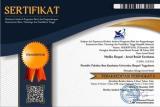EFEKTIFITAS KOMBINASI TERAPI AKUPUNTUR DAN REBUSAN TEH HIJAU DALAM MENURUNKAN KADAR GLUKOSA PADA PASIEN DIABETES TIPE 2
Abstract
Background: diabetes mellitus type 2is one of the major health problems in the world. Uncontrolled diabetes mellitus can cause serious complications such as kidney disease, vision problems, cardiovascular disease and leg amputations that contribute to morbidity and mortality in diabetic patients. There are various approaches to treat and prevent diabetes and its secondary complications, one of which is a combination of acupuncture therapy and green tea stew.
Objective: to determine the effectiveness of the combination of acupuncture therapy and green tea stew in reducing glucose levels in patients with type 2 diabetes.
Methods: The design of this study was quasi-experimental, the sample size was 30 people divided into three groups, 10 people (received acupuncture therapy), 10 people (got green tea stew), and 10 people (acupuncture and green tea combination). The intervention was carried out for 4 weeks, with acupuncture therapy 2 times a week and drinking green tea stew 2 times a day. Analyze data to find out the differences between groups of interventions using the ANOVA test.
Results: The results of this study were obtained by ANOVA test at week 2 with p value 0.016 and at week 4 with p value 0.002 (p <0.05), which means there were differences in the amount of glucose in patients with type 2 diabetes mellitus given acupuncture combination and green tea stew with only acupuncture or green tea stew.
Conclusion: there is a difference in the amount of glucose in patients with type 2 diabetes mellitus who are given a combination of acupuncture and green tea stew with those who are only given acupuncture or green tea stew.
Keywords
Full Text:
PDFReferences
American Diabetes Association. (2010). Diagnosis and Classification of Diabetes Mellitus. Diabetes Care Vol. 33. p 62–69.
AHFS Drug Information. (2012). Authority of the board of the american society of health sytem pharamcists.USA: American Hospital Formulary Service.
Cabrera, C., Artacho R., Gimenez, R. (2006). Beneficial effects of green tea: a review. J Am Coll Nutr, (25): 79-99.
Chen, C., Wang, H.C., Zhai, X., et al. (2018). Progress of research on mechanism of acupunture for diabetes mellitus. Zhen CI Yan Jiu, (43): 6-1-603.
Chen CM YM. (2013). The prevalence and determinants of impaired fasting glucose in the population of Taiwan. BMC Public Health. Dec 5;13:1123. doi: 10.1186/1471- 2458-13-1123
Covington, M.B. (2001). Traditional Chinese Medicine in Treatment of Diabetes. Diabetes Spectrum, 14(3): 154-159.
Effendi,F. & Makhfudi. (2009). Keperawatan Kesehatan Komunitas: Teori dan Praktek dalam Keperawatan: Jakarta: Salemba Medika.
Grossman, L.D. (2018). Complementary and alternative medicine for diabetes. Canadian Journal of Diabetes, 42, 2018: S154-S161
Ingle, P.V., Samdani, N.R., Patil, M.S, et al. (2011). Application of accupunture therapy in type 2 diabetes mellitus patients. Pharma Science Monitor, 2 : 18-26.
Iso H, Date C, Wakai K, Fukui M, et al. (2006). The relationship between green tea and total caffeine intake and risk for self-reported type 2 diabetes among Japanese adults. Ann Intern Med. 144:554–562
Kim, H.M & Kim, J. (2013). The effects of green tea on obesity and type 2 diabetes. Diabetes Metab J. 37(3): 173-175.
Kim, Y.J. (2017). Diabetes mellitus in a patient with myasthenia gravis: a case report. Journal of Acupunture and Meridian Studies, 10 (4): 290-293.
Meyer MR, Clegg DJ, Prossnitz ER and Barton M. (2011). Obesity, Insulin resistance and diabetes: sex differences and role of oestrogen receptors. Acta Physiologica Vol. 203 (1). p 259–269.
Nilawati. (2008). Care your self kolestrol. Cetakan I. Jakarta: Penerbit Plus.
Nurlaily. (2010). Analisis beberapa faktor resiko terjadinya diabetes mellitus pada RSUD dr. Mm Dunda Limboto Kab Gorontali (serial online) http://dc162. 4shared.com/doc/nQxQGwrK/ preview.html
Park, J.H., Bae, J.H., Im, S.S., et al. (2014). Green tea and type 2 diabetes. Integrative Medicine Research, 3(1): 4-10.
Rahajeng, E. (2001). Prevalensi Diabetes Mellitus dan Gangguan Toleransi Glukosa di Kota Depok Jawa Barat. Laporan Penelitian. Badan Litbang Depkes RI. Jakarta.
Rana Jamals, Triciay, Manson Joanne and Hu Frank B. 2007. Adiposity Compared With Physical Inactivity and Risk of Type 2 Diabetes in Women. Diabetes Care Vol. 30 (1). p 53–58.
SEARO. (2015). Diabetes Facts and number Indonesia.http://www.searo.who.int/indonesia/topics/8-whd2016-diabetes-facts-and-num bers-indonesian.pdf
Sorigere et al. 2012. Prevalence of diabetes mellitus and impaired glucose regulation in Spain: the Di@bet.es Study. Diabetologia. 55. p 88–93.
Wagner, R. et al. (2013). Family history of diabetes is associated with higher risk for prediabetes: a multicentre analysis from the German Center for Diabetes Research. Diabetologia.
Wang, Q. (2003). The present situation of TCM treatment for diabetes and its researches. J Trad Chinese Med, 23:67-73.
Wang, Z., Wang, J, & Chan, P. (2013). Treating type 2 diabetes mellitus with traditional chinese and Indian medicinal herbs, Evidance Based Complement alternat Med, Vol 2013.
WHO. (2016). Global Report on Diabetes. France: WHO Library Cataloguing in-Publication Data.
Wu CH, Lu FH, Chang CS, Chang TC, Wang RH, Chang CJ. (2003). Relationship among habitual tea consumption, percent body fat, and body fat distribution. Obes Res. 11:1088–1095.
Wu, C., Qu S., Zhang J, Chen J, Zhang S, Li Z, et al. Correlation between the effects of acupuncture at Taichong (LR3) and functional brain areas: a resting-state functional magnetic resonance imaging study using true versus sham acupuncture. (2014). Evid Based Compl Alternat Med. 2014: 729091.
Yang, D. (2004). Clinical observation on therapeutic effects of accupunture treatment for 100 cases of type II diabetes. J Acupunct Tuina Sci, 2: 34-35.
Yu, J., Song, P., Perry, R., et al. (2017). The effectiveness of green tea or greean tea extract on insulin resitance and glycemic control in type 2 diabetes mellitys: a meta-analysis. Diabetes Metab J, 41: 251-262.
Zheng, Q.Y., Yang, H.S., Xiang, R.R., et al. (2016). Meta-analysis of accupunture treatment for type 2 diabetes. Shanghai J Acu-mox, (35), 618-622.
DOI: https://doi.org/10.35842/mr.v15i2.203
Article Metrics
Abstract view : 754 ViewPDF - 128 View
Refbacks
- There are currently no refbacks.
Copyright (c) 2020 Medika Respati : Jurnal Ilmiah Kesehatan
Medika Respati : Jurnal Ilmiah Kesehatan indexed by:








